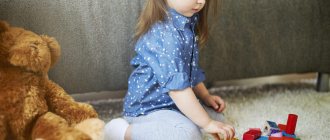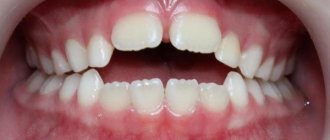Parents always wait with special trepidation for their child's first words. Typically, by the age of 2, most children begin to talk, but this does not always happen. In the practice of speech therapists, there are often cases when a child does not speak at the age of 2, although he understands speech addressed to him.
This worries parents; they turn to specialists, trying to find out the reason why the child does not speak at 2 years old.
All experts agree: at 2 years old it is too early to sound the alarm that the child does not speak. At this age, there may be some delay in speech development even in completely healthy children, which can be compensated in the future.
However, if the parents are really concerned about the problem, it is worth figuring out whether the child has a delay in speech development, a speech disorder, or whether he is developing normally.
Signs of delayed speech development at 2 years:
- The child does not want to talk, i.e. does not try to repeat words after adults;
- The baby does not respond to adults’ requests to repeat words;
Only if the child exhibits the listed signs can we talk about delayed speech development.
If he tries to repeat the words of adults in his own way: hums, babbles in his own language, reacts to speech addressed to him, the child develops normally.
Parents just need to help their child start speaking by stimulating his development through games and activities. If a child has signs of delayed speech development, you should figure out what the reasons are behind this.
Why doesn't a child speak at 2 years old?
Neurological diseases are often one of the most common causes of deviations in the speech development of children. These include:
- Damage to the central nervous system and underdevelopment of the brain.
- General hypotonicity (and in particular hypotonicity of the facial muscles).
- Congenital pathologies of the development of the tongue, lips, palate, facial muscles.
Neurological pathologies can lead to severe speech disorders, such as:
- Motor alalia
- Sensory alalia
- Dysarthria
- Aphasia
Motor alalia
This is a disease in which a child may not speak at all, or speak poorly, confusing the endings. At the same time, the child understands what adults are telling him.
The cause of the disease is damage to the speech motor analyzer - Broca's center and its pathways.
Signs of a speech disorder:
- A child of 2 and a half years old does not yet speak. He begins to pronounce his first words at the age of 4 years.
- Builds sentences incorrectly, uses words in the wrong form and case.
- Has a very limited vocabulary.
- Hyperactive or, conversely, sedentary.
- Refuses to communicate with adults and children, does not want to make contact, and is sometimes aggressive.
Sensory alalia
A disease characterized by underdevelopment of impressive speech. When hearing is intact, understanding the speech of others is impaired.
The cause of the disease is damage to the part of the brain responsible for correct speech analysis.
Signs of this pathology:
- Disinhibited speech. The little one is chatting, but the adults don’t understand what he’s saying.
- Low intelligence.
- When communicating with a child, he has difficulty perceiving the speech of others by ear.
- Replacing letters.
- Pronouncing several words together, as a single word.
- Hyperactivity, combined with depression.
Dysarthria
This disease is characterized by an irregular breathing rhythm, a nasal voice, and unclear pronunciation of sounds.
At the physical level, the pathology is manifested by weak tone of the facial muscles. The baby almost cannot lift his tongue up and reach the outer corners of his mouth. The tongue of a child suffering from dysarthria at 2 years old trembles. There is profuse salivation.
The cause of the disease is asphyxia of the brain, genetic predisposition, diseases of the central nervous system.
Aphasia
It is a common reason why a 2.5 year old child does not speak. With this pathology, the child’s speech is distorted: the pronunciation and meaning of phrases are impaired. However, hearing may be normal.
The cause of the disease is head injuries, cancer, complications from infectious diseases.
Physiological reasons
The physiological reasons for the lack of speech at 2 years old include the following problems:
- Hearing impairment.
Any hearing loss has a negative impact on speech development. Children suffering from hearing loss are always lagging behind in speech development. If a child does not speak at 2.5 years old, parents should contact an otolaryngologist and have the child’s hearing checked.
- Underdevelopment of the speech apparatus.
Weakness of the jaw and facial muscles can cause a child of 2 years to not speak. Signs of articulation disorders include increased drooling, a slightly open baby's mouth, and a gag reflex that occurs when trying to swallow solid food. The causes of impaired articulation may be too early weaning, as well as a short frenulum under the tongue.
- Genetic predisposition.
It happens that a child is almost 2 years 9 months old, but he does not speak. At first glance, a healthy baby who does not have any physiological abnormalities may have a genetic predisposition to a delay in speech development.
Perhaps one of the parents or other relatives had the same pathology, and it was inherited by the child. In this case, forcing the child to speak is useless. You can only help him by stimulating his speech development through games and activities.
Psychological reasons
- Often a child at 2 years old does not speak due to lack of need to speak. Adults anticipate all his desires, are overly protective, and he no longer has the need to express his needs to adults. In this case, parents should stop patronizing the child and start stimulating his speech: ask open-ended questions more often, do not rush to satisfy the child’s every desire, he just needs to point to the desired object with his finger.
- A common reason why a child at two years old does not speak is stress or fear of the child. A child can develop normally, and then, after experiencing some kind of stress (separation from mother, moving, illness), take a step back in speech development.
Case from practice: at an appointment with a child psychologist, a mother says that her daughter started talking at 2 years 2 months. However, after she and her husband divorced, the child stopped communicating with loved ones. The girl became silent and “forgot” the words she had previously spoken. Now the child is 2 years 8 months old and she does not speak. In this case, the child clearly experienced stress due to his parents' divorce, which affected his development. When you are stressed, it is important to help get through it as quickly as possible. It is better to contact a child psychologist, who will help the child relieve accumulated tension in a playful way.
- Another psychological reason for not speaking at the age of 2 years may be the lack of proper attention to him. In such families, parents spend little time with their children, communicate little, and do not encourage conversations and joint developmental activities.
A 1.5 year old child is silent, but understands everything.
Sections
Question to the speech therapist:
Dear Anna Vladimirovna! I really count on your consultation on this issue: My daughter is already one and a half years old, she says the only word “HELLO” (hello), and not often. Not “mom”, not “dad”, not “baba” - nothing! She doesn’t say “give me”, and doesn’t ask for anything at all - neither food nor drink; if necessary, she tries to get it herself (and this is rare, mostly she just starts being capricious, and I can already guess what’s going on). Does not repeat after us, does not imitate animal sounds (moo, woof, woof, etc.). At the same time, the child hears well, because he responds to the name, even if I call from the next room, he runs towards the sound of the TV, and is frightened by sharp sounds (at the neighbor’s house, when the walls are being drilled, he begins to cry). The meaning of the words “on”, “give”, “cannot” is understood perfectly. Speech development lags behind from birth - babbling after 3 months, and even then rather scantly, syllables and babbling after 10 months. Can't stand finger games, pulls his hand away and leaves. Since he was a year old, we have been developing fine motor skills - sorting (touching and scattering) cereals, pasta, beads and buttons. He loves books and listens willingly (bright pictures and several lines of text on a page; if there is more text than pictures, he turns to another page). Somewhere after a year, speech activity appeared in the form of gibberish (nothing meaningful, and most importantly, not even a “gibberish” word was assigned to any of the objects or actions). True, sometime after 11 months, my daughter clearly pronounced “A-a-a” when sitting on the potty. Then that too disappeared. Now the only conscious sound in use is “ALYO”, while imitating a conversation on the phone (pressing his hand to his ear) and then uttering another tirade of incomprehensible sounds. He doesn’t address us in any way (only when he cries, he can say ma-ma-ma-ma), but in response to the question “Where is mom (dad, brother, cat)?” turns his head towards the person he is looking for. Emotionally safe, laughs, rejoices at family and friends, gets offended, cries - everything in time. I have already tortured our neurologist, we have completed three rehabilitation courses (she was born premature, at 33 weeks, she was slightly behind in motor development, but by the age of one year she had caught up with her peers), now we are in line for the next one (massage of the speech zones, paraffin, laser for the same speech zones). Maybe you really shouldn’t worry, but just wait? But it’s so scary to miss time, because sometimes not everything can be restored precisely because of inaction. I had high hopes for the kindergarten (everyone claims that our girl will start talking there), but with the kindergarten we, as they say, flew by. Now I’m looking for advice from a professional specialist, and not advice from grandmothers on the bench. Thanks in advance, I really hope for an answer. (Ekaterina)
Answer: Dear Ekaterina, you did the right thing by starting to sound the alarm earlier. Judging by your letter, the girl really has problems with speech, which can and should begin to be eliminated even at such an early age.
You write that the child had a delay in speech development at an early age. The delay in humming, its lack of intonation, the delay in the babbling phase, its failure to address an adult - all these signs are symptoms of speech disorders. The poverty of intonation (from the Latin “to pronounce loudly”, a complex complex of prosodic elements including melody, tempo, timbre, rhythm, intensity and logical stress at the sentence level to express various syntactic meanings and categories, as well as expressions and emotions) is sometimes compensated by the expressiveness of facial expressions , eye. And in your case, the girl resorts to whims, by the intonation of which the mother is able to understand what the child wants at the moment.
The vocabulary of such children accumulates slowly; the first words may appear by three to five years (normally by 1.5 years). Speech in this case is characterized by slurredness, crumpledness, ungrammaticality, and convolutedness.
Continue to develop fine motor skills of the hands, because the centers responsible for hand movement and articulatory movements (lips, tongue, lower jaw, soft palate) are located in the cerebral cortex in the immediate vicinity of each other, therefore massaging and developing the fingers, thereby promoting and the development of articulatory motor skills. If your daughter cannot tolerate finger games such as “Magpie-White-sided”, “Ladushki”, etc., turn to more advanced types of games. Start painting with finger paints, both with your fingers and with your entire palm. Start sculpting with salt dough; it is less toxic for young children, who are eager to try everything on their tongue. I can also recommend games with finger puppets and thimble dolls; this activity is very exciting for young children. Undoubtedly, it is necessary to find a good speech therapist to work with the child, who will help establish emotional contact between you and your girl, promoting the development of the baby’s active speech.
You write about the girl’s reluctance to repeat words and sounds after adults, or imitate the sounds of animals. It is speech imitation that is the most important and effective technique in working with non-speaking children. This is a natural period in the development of children's speech, both normally and in the case of speech disorders.
It is necessary to create conditions in which the child will have a desire to pronounce (repeat) the same sound combinations repeatedly. To do this, you need to establish emotional contact with the child (play the “simplest” games with the baby, which will bring her into a state of activity - physical, fun - emotional and peace - mental), place him in a situation of success (praise him, even for the slightest achievements, if the child did not answer your question, say that he did well, because he tried his best, next time he will definitely succeed).
Imitating the speech of an adult occurs in several stages: - Repetition of amorphous words . These are the very sounds and syllables that carry meaning in a child’s speech (oo-oo-oo, zh-zh-zh, aw-aw, bi-bi, buh, meow, yum-yum, doo-doo, kup-kup , glug-glug, etc.). In addition to correctly pronounced simple words, such as mom, dad, give, na, etc., “abnormal words” may also be present. They are divided into fragment words (for example, milk - “moko”, car - “sina”), onomatopoeic words (for example, am-am - eat, top-top - walk, mud-cow, meow - cat, bang - fell, etc.) and contour words in which the stress and number of syllables are correctly pronounced (for example, “tititiki” - bricks, “patina” - car, “mapata” - shovel). Also, children’s speech may contain words that do not at all resemble the words of their native language or their fragments (in this letter they are called gibberish). Such autonomous speech of a child cannot be reinforced and supported. Also, you should not repeat after the child the substitute words he reproduces; the adult should give the child examples of CORRECT speech. - Repetition of words. At the beginning these are short words, such as: mom, dad, give, na, kitty, duck, etc. At this stage, it is possible to use “light words” in speech (not cat, but kitty). Particular attention should be paid to the child’s mastery of verbs, because They play an important role in the development of children's speech: the more words-actions, the higher the level of its development in the child. - Repeating short phrases. This is the stage of combining several words in one sentence (at the initial stage - 2-3 words). For example, Here is a spoon. There's a ball there. Where's mom?
Games for the development of speech imitation.
- Listen to a poem about an airplane: We’ll build the airplane ourselves, Let’s fly over the forests, Let’s fly over the forests, And then we’ll return to mom.
Let's play airplanes! The planes flew into the sky and buzzed: “U-U-U!” With our arms straight out to the sides, we run around the room, accompanying our movements with the pronunciation of a long continuous sound U.
Similar to this game, we play “Steam Locomotives” (tu-tu), “Steamboats” (s-s-s), “Cars” (zh-zh), etc. And also adapt any other children's poems by adding simple amorphous words (boom, bom-bom, bi-bi, gop-gop, mur-mur, oh-oh-oh, ay-ay-ay, jump-jump, la- la-la, etc.)
In conclusion, I would like to add that on my blog I posted an article entitled “Let’s talk to the “silent” from 1.5 to 3 years old”, I talked about the need for constant communication with the child. I would like to give some ambiguous advice: you need to talk a lot, but not enough, i.e. The adult communicates with the child constantly, but at the same time uses short phrases of 2-4 words in his speech. But the speech therapy joke “Repetition is the mother of stuttering” is not appropriate here, because It is repeated repetition, repeated utterance of everyday situations or artificially created ones (games, activities) that will bring a positive result.
This is roughly how your conversation with your child should be structured:
Washing.
- Let's go wash up. Let's open the tap. No, not this way, the other way. Like this. Where's the soap? Here's the soap. Take soap and wash your hands. Put the soap in the soap dish. Let me help you. Three hands good. Now let's wash off the soap. Place your hands under the water - like this. Now let's wash our face - like this. Take water into your palms and rub your face. Close the tap. Where's the towel? Take a towel and dry your face and hands. Well done! Look how clean it has become.
Let's build a house.
- Look what cubes we have. Show me where the red cube is? That's right, here it is. Where's the yellow one? Where's the blue cube? Right here. Let's build a house out of cubes. What kind of house will it be - big or small? Show me. Big? Fine. Here I placed the cube. Now you bet. put it here...
I wish you patience, imagination and success.
Sincerely, Anna Arnautova.
Consultant's response published 07/13/2009
speech therapist →
What to do if the child does not speak
If the child does not have serious pathologies, every parent can help their child start talking. Below are recommendations from experts that will help get the most silent little one talking.
Advice from speech therapists
- Encourage your child to communicate. Try to talk to your baby more. Name the objects you see around you, try to pronounce words to your child slowly and clearly.
- Try to communicate with your child correctly, without distorting words.
- Encourage and praise your baby for any sounds and attempts to pronounce words.
- Ask open-ended questions: who is in the picture? What is the name of this doll? What color is this car?
- Don't rush him to answer. Wait for the baby to answer, do not interrupt him, getting ahead of him with the answer to the question asked.
- Try to read books to your baby more and tell fairy tales. This will enrich his vocabulary and promote speech development.
- Sing simple songs. Humming songs with your baby will also have a positive effect on his speech development.
- Do articulatory gymnastics. Try to spend 10-15 minutes exercising daily. This time will be enough for the baby to learn to control his lips and tongue.
- Teach your baby to breathe correctly. Correct speech breathing will help him learn to correctly pronounce sounds and then words. Speech inhalation must be done through the nose, speech exhalation through the mouth.
A 2-year-old child does not respond to words, what to do?
Of course, treat! The first and one of the main tasks of parents is to eliminate the cause that caused the deviation (primarily, this applies to families with an unfavorable environment). Very important points in treatment are attentiveness to the child, moral support and patience, because correction is a complex and painstaking process.
Complex treatment is provided at the Bersenev Medical Center. The clinic’s specialists draw up an individual program of treatment and correction of the disease for each child. The program includes a set of rehabilitation activities carried out by a pediatric neurologist, massage therapist and speech therapist. A psychologist, a reflexologist and, of course, parents also take part in the treatment.
In addition to standard procedures, the complex includes speech therapy massage, metameric reflexology, and the center’s unique method - metameric acupressure. Parents also receive a specially designed program of exercises and training at home individually for each child.
If you find symptoms of pathology in a child, you should not guess on the topic “a 2-year-old child does not listen, what should I do?” Be sure to consult a specialist. The sooner you begin treatment for this disease, the greater the child’s chances of a full recovery. You can make an appointment with a pediatric neurologist by calling the contact center or by calling the children's department.









